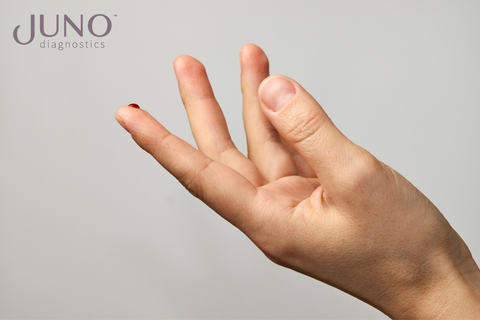What is NIPS (Non-Invasive Prenatal Screening)?
What is Non-Invasive Prenatal Screening?
Non-invasive prenatal screening (NIPS), sometimes called non-invasive prenatal testing (NIPT), assesses the likelihood of certain chromosomal variations in pregnancy. This evaluation analyzes small fragments of DNA present in a pregnant person's blood.
It’s important to remember that NIPS is a screening test – meaning it doesn’t provide a definitive diagnosis of a fetal chromosome condition. Instead, NIPS provides a risk assessment for specific disorders which can be present in any pregnancy.
How Does NIPS Work?
A pregnant person's blood contains maternal DNA and DNA from the placenta. These DNA sources are referred to as “circulating cell-free DNA,” or just “cfDNA” for short, as the DNA fragments are no longer held together in the form of chromosomes and housed within a cell.
Following a simple blood collection, non-invasive prenatal screening (NIPS) analyzes the cfDNA fragments within the blood, offering an opportunity for early detection of certain chromosome conditions such as trisomy 21 (Down syndrome), trisomy 18 (Edwards syndrome), and trisomy 13 (Patau syndrome). During pregnancy, most cfDNA in a sample will be derived from the pregnant person, not the fetus. However, when NIPS identifies more or less DNA from a specific chromosome than what is expected for the average pregnancy, this flags the sample as “high risk” for a chromosome variation (also called “aneuploidy”).
NIPS poses no physical risk to the mother or the baby, as the sample is collected through blood collection only. The only risks to the pregnant person are those associated with routine blood collection and the possibility that NIPS may identify information that may cause stress or anxiety for some.

What Does NIPS Examine?
NIPS is most often used to look for chromosomal variations caused by an extra or missing copy of a chromosome (aneuploidy). Most commonly, NIPS will include risk assessment for the following conditions:
- Trisomy 21 / Down syndrome
- Trisomy 18 / Edwards syndrome
- Trisomy 13 / Patau syndrome
- Monosomy X / Turner syndrome
- XXY Syndrome / Klinefelter syndrome
- Trisomy X / Triple X syndrome
- XYY Syndrome / Jacobs syndrome
Your doctor, nurse practitioner, physician assistant, nurse midwife, genetic counselor, or other obstetrical providers may recommend additional screening through NIPS, such as screening for certain chromosomal microdeletions (very small missing pieces of DNA) or screening across all 23 pairs of chromosomes.
If you want to know your baby’s sex, you can learn that with NIPS too, or Juno can keep it a surprise!
When Can Non-Invasive Prenatal Screening Be Performed?
Non-invasive prenatal screening can be performed after nine (9) weeks of gestation when the placenta is large enough in size for it to release detectable amounts of cfDNA for NIPS technology. At earlier gestational ages, the ratio of maternal DNA to placental DNA makes it very difficult to measure the amount of cfDNA for fetal aneuploidy screening since the vast majority will be from the pregnant person and not from the placenta.
Who Should Consider Non-Invasive Prenatal Screening?
NIPS is completely optional during any pregnancy. The American College of OB/GYNs (ACOG) recommends that every pregnant person be offered NIPS as part of prenatal care since NIPS is the most reliable screening test for fetal chromosomal variations. While even those with “average-risk” or uncomplicated pregnancies may benefit from the information provided by NIPS, those with specific “high-risk” pregnancy indications may especially be interested in NIPS. Some of these high-risk indications include:
- Maternal age of 35 and older at delivery
- A personal or family history of a pregnancy with a chromosomal variation or chromosomal abnormality
- High-risk results from serum screening, such as first-trimester screening, integrated screening, sequential screening, or quad screening
- Suspicious or abnormal findings on a prenatal ultrasound, such as a first-trimester nuchal translucency sonogram or the 20-week anatomy sonogram
- A chromosomal variation, such as a translocation, in either genetic parent
- Maternal carrier status of an X-linked recessive condition
Deciding whether to have NIPS should always be a personal decision, so it’s OK to take the time you need to determine what’s best for you.
How Accurate is NIPS?
Extensive research shows that NIPS is the most accurate screening test for fetal chromosome conditions.
When considering NIPS, it’s important to have a screen that’s both sensitive and specific.
- The sensitivity of a screen is its ability to detect a condition that’s really there. In other words, a highly sensitive NIPS would provide “high risk” or “screen positive” results for at least 99 out of 100 samples if each of those 100 samples came from pregnancies with Down syndrome. In this scenario, only one person would receive a “false negative” result.
- The specificity of a screen is its ability to correctly identify which samples are not at an increased risk for the screened condition. For example, a highly specific NIPS would provide “low risk” or “screen negative” results for at least 99 out of 100 samples if each of those 100 samples came from pregnancies without Down syndrome. In this scenario, only one person would receive a “false positive” result.
Even with a very sensitive and specific NIPS, the positive predictive value (PPV) of a “screen positive” result (or the likelihood that a screen positive result is a true positive case) depends on how common or rare the screened condition is in that population. Therefore, NIPS for more common conditions (like Down syndrome) will generally have more accurate results than NIPS for rare conditions. It’s always important to review screen positive or high-risk NIPS results with a genetics expert, such as a genetic counselor.
Where To Get More Information?
As a Juno patient, you’ll have access to genetic counseling services. Our genetic counselors can help better inform your screening decisions or review your results and any concerns from the comfort of your home - just call or click to set up a consultation. Whether you are still deciding if the NIPS is right for you or if you want to discuss what your results mean for your specific situation, JunoDx will be with you every step of the way.
Please be aware: JunoDx.com and the materials and information it contains are not intended to be and do not constitute medical advice, other health advice, or diagnosis. Do not use JunoDx.com or the materials and information published at JunoDx.com as a substitute for medical care and treatment. You should always consult with a qualified physician or healthcare provider about your specific circumstances.

